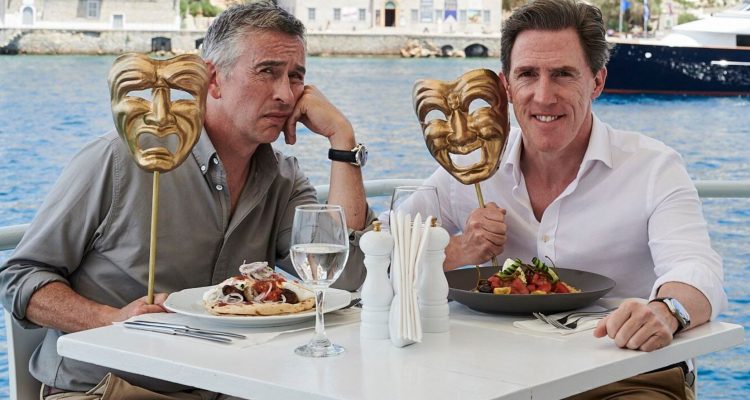There are many viewers who, upon hearing that “The Trip to Greece” is very much like the three previous entries in Steve Coogan and Rob Brydon’s comic culinary road trip flicks, will be not disappointed but absolutely delighted. Given the current state of uncertainty and the likelihood that social-distancing will dramatically impact the ability of studios to produce new movies, new incarnations of the familiar and beloved are treasured. Many would be delighted to hear that the pair had scampered off to tour France, Israel, Japan, and maybe even Iceland before the shelter-in-place orders came down.
But the world we live in is a cold and unforgiving place where all good things—like ‘The Trip‘ movies and the more expansive TV series which the features are boiled down from—must come to an end. So, it is fitting that for their last sojourn, Coogan and Brydon decide to retrace the steps of Odysseus starting in Turkey and into Greece. There is nothing terribly original about this premise, as a host of travel essayists have had the same idea. But as Odysseus returned home after his troubled journey to find yet more strife, Coogan and Brydon go back to their familiar schtick—long drives and touristy rambles punctuated by expensively minimalist dinners, all of it borne on a tide of joshing, snarky banter—only to discover more discomfort.
The dynamic set up by the two with director Michael Winterbottom has not changed much since they knocked around the north of England in 2010’s “The Trip” or subsequent iterations in Spain and Italy. They are still playing exaggerated versions of themselves: comic actors with just enough success to see the levels of stardom they will probably never reach. The dynamic is much the same. Coogan remains the somewhat insufferable mansplainer who only interrupts his running lectures on ancient Greek history to chastise Brydon for not at least pretending to be more learned. Brydon is still the seemingly less ambitious and far happier one who gets most of his fun out of needling Coogan.
But while the basics have not changed, their relationship feels pitched at a higher level and marked by a greater degree of tension. Coogan’s pettiness, competitive vindictiveness, and anxiety about his age have apparently been turbocharged by his more recent success, which leads to things like his continual references to “my seven BAFTAs” and turning an offhand comment about swimming into a demand for a race. In a nice bit where Brydon pretends to be reading a newspaper story about Coogan’s disappearance (“British comic goes missing…”), Coogan interrupts him with a petulant correction (“British actor goes missing…”). The gags and imitations are still there, though with just a hint of desperation. Brydon performs a decent Homer oration only to undercut it with a needy side note that he was really just doing Anthony Hopkins.
Does it matter that at the end of all this, except for looking slightly more grizzled Coogan and Brydon seem to have changed not a tick, despite ten years of travel and talk? Probably not. By the time viewers met them in the first and still best movie in the series, they were already well into the stage of grumpy, middle-aged dissatisfaction that rarely leads to self-discovery. What has continued giving the series its pulse is watching their personalities bang into each other just to get a reaction. Because as much as the two men are juiced by pouncing on the other’s every word or inflection, the yawning gap between those petty skirmishes and the unyieldingly immense gravity of the landscapes they travel through gave the movies an interesting jolt. Winterbottom adds an extra note of gravity and metatextual commentary by having Coogan run into Kareem Alkabbani, who played a stranded refugee in the satire “Greed” (which was also shot in Greece) and here is looking for a ride back to the camp he lives in.
For the most part, these movies have seemed like the lightest of fare. At times, they even felt akin to a con job. It seemed just possible that Coogan and Brydon had figured out a way to ramble through a version of the Grand Tour in which they ate fine cuisine and dumped last night’s Wikipedia cruising on each other as knowledge, while polishing up various performance bits and having somebody else to foot the bill. But whatever the driving impulse, the end result was a win for the audience, with dry comedic travelogues that balanced frequently hilarious runs in which the two spurred each other in a spiral of free associations (one of the best such moments in ‘Greece’ goes from Coogan referencing Hercules to Brydon riffing on “Hercules in New York” which leads to Arnold Schwarzenegger impressions, then Werner Herzog, and so on).
‘The Trip’ quartet illustrates with brilliant color, life, and spikiness just how the journey can matter more than the destination. Not that “The Trip to Greece” is any slouch, visually. If anything, the long hovering aerial vistas of sparkling blue waters, rolling tree-covered hills, and bright white villages could be more beautiful than anything seen in the earlier movies. But there is also a more downbeat subtext here about aging, disappointment, and mortality which wends its way through the gags and Coogan and Brydon’s half-amused half-annoyed badinage. At one point, the pair hikes a long distance to visit the shrine to Aristotle. Coming to it, wheezing and hot from the sun, they find a small, jumbled pile of white stones. “You can see why they don’t charge,” quips Brydon. [B+]
“The Trip to Greece” is set to be released on May 22.

